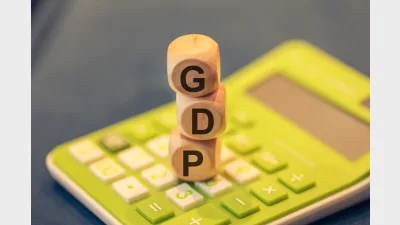GDP print reveals economy sustained by population growth, government spending



Economic growth was weaker than expected, once again highlighting an economy largely sustained by population growth and government spending.
According to seasonally adjusted data released by the Australian Bureau of Statistics on Wednesday, Australian gross domestic product (GDP) rose 0.3 per cent in the September quarter 2024, and by 0.8 per cent since September 2023 – the slowest annual growth in GDP in more than three decades.
While the economy grew for the 12th quarter in a row, it has continued to slow since September 2023.
GDP per capita fell by 0.3 per cent, falling for the seventh straight quarter.
Similar to last quarter, economic strength was primarily driven by public sector spending, with both government consumption and public investment playing key roles in driving growth.
In fact, government spending rose by 1.4 per cent, with social benefits to households increasing via the energy cost relief rebates.
Public investment rose 6.3 per cent in the September quarter, with general government investment growing 6.0 per cent on the back of defence equipment imports and investment in hospitals and roads. Recurrent public spending increased by 1.4 per cent on the quarter in the September quarter, and 4.7 per cent over the year.
Conversely, household spending remained flat in the September quarter after a 0.3 per cent decline in June, with electricity and gas spending being the largest drag on growth due to energy bill relief rebates.
Business investment fell over the quarter, driven by a decline in both non-residential construction (-1.8 per cent/quarter) and new engineering construction (-1.5 per cent/quarter). However, there was a partial offset by a lift in machinery and equipment (+0.6 per cent).
Commenting on the latest data, CBA’s Gareth Aird said the economy clearly remains two-speed.
“Economic growth in the private sector has been non-existent over the past two quarters. It is only public spending that has kept GDP growth positive over that period,” the head of Australian economics at the big four bank said.
He explained that this is an unusual situation, one that largely accounts for the persistent period of weak productivity growth.
“The government sector continues to grow as a share of the economy. Indeed, the lift in public recurrent expenditure has been quite extraordinary over an extended period of time,” Aird said.
“Restrictive monetary policy has clearly worked to slow private demand growth in the economy. And despite a boost in household income via the Stage 3 tax cuts, there was no commensurate lift in consumer spending in the September quarter, as we anticipated,” the economist added.
Reflecting on the implications the GDP print could have on the Reserve Bank, Aird highlighted the central bank’s GDP forecast for the fourth quarter – which puts growth at 1.5 per cent on the year.
Based on Wednesday’s outcome, he said, the economy would need to grow by 0.8 per cent on the quarter in Q4 24 for the RBA’s forecast to come to fruition.
“We continue to believe that the RBA’s forecast for Q4 24 GDP is too strong. And that coupled with our expectation for the unemployment rate to edge higher over coming months and trimmed mean CPI to print at 0.6 per cent/qtr (or lower) in Q4 24 means we stick with our call for the RBA to commence normalising the cash rate in February,” Aird said, but admitted the risk “clearly” sits with a later start date to the rate cutting cycle.
“The RBA board will have the opportunity to opine on today’s national accounts in the statement accompanying the December decision next week. And the governor can also cover the national accounts in her press conference.
“We expect the board will leave the cash rate on hold next week in a straightforward decision.”
Andrew Canobi, director of Franklin Templeton Fixed Income, offered a similarly bleak view of the economy, describing the GDP report as a “sea of weakness”.
“Q3 at 0.3 per cent was softer than an already modest expectations but the economy is firmly in contraction when you remove the strong level of public spending,” Canobi said.
“Annual growth of 0.8 per cent is woeful and again highlights an underlying weak private sector.”
As for the RBA, he said it will not see this data as a reason to cut but opined that the print “tells us the private sector is well and truly reacting to tight policy”.
Treasurer and his opposing number at odds
Treasurer Jim Chalmers was more optimistic, stating that “our economy is growing but very slowly”.
“Our policies are designed to help Australians earn more and keep more of what they earn, and while we have more work to do, the data shows we are making progress,” Chalmers said.
“Today’s data confirms the substantial progress we have made in the fight against inflation,” he added.
“We’ve been planning and preparing for a soft landing, and with the economy still growing, inflation back in the band, unemployment in the 4s and more than a million new jobs created, we are on track for one”.
The Treasurer added that Wednesday’s data is “another demonstration” that the government’s “balanced approach” is the right strategy for Australians and the Australian economy amid global uncertainties.
His counterpart, Angus Taylor, disagreed, accusing the Treasurer of being addicted to spending and holding responsibility for the “longest household recession on record”.
Recommended for you
In this latest edition, Anna Shelley, CIO at AMP, shares the fund’s approach to current market conditions and where it continues to uncover key opportunities.
The mega fund has announced a $2.2 billion investment in a leading data centre platform, bringing its global real assets portfolio to nearly $60 billion.
In this latest edition, Australian Retirement Trust’s head of global real assets Michael Weaver explains the fund’s approach to finding new opportunities as it surpasses $300 billion in funds under management.
Fund managers remain hopeful for a Chinese revival story despite the “disappointing” stimulus package announced this week.












